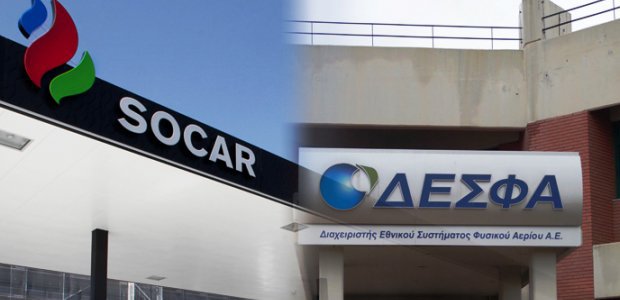Yesterday’s collapse of the long-running attempt to sell a 66 percent stake of DESFA, Greece’s natural gas grid operator, may have offered some leeway to the Greek government, which never felt completely comfortable about this specific sale, but it also raises a number of questions.
These issues range from how Greek officials will handle a letter of guarantee provided by Azerbaiiajni energy firm Socar, the initial buyer which was later joined by Italy’s Snam as a partner for the deal; the shape of the new tender; as well as bigger matters such as the country’s image as an investment market and the impact on Greece’s geopolitical standing.
Energy ministry officials, who hold the prospective buyer accountable for the collapse, contend that Socar’s letter of guarantee, worth 40 million euros, or 10 percent of the 400 million-euro sale price, should be nullified, which would deprive the Azerbaijani company of a refund. On the contrary, local legal experts believe that such an intention is groundless as the buyer did not deviate from the tender procedure’s regulations. It remains to be seen whether this separation will be a smooth process or not.
The failure to finalize the DESFA tender deprives TAIPED, the state privatization fund, of an anticipated 188 million euros in 2017. This amount represents DESFA’s 31 percent of the 66 percent share that was put up for sale. The country’s lenders will most likely demand that this monetary gap be covered by another sale. It remains to be seen which Greek asset will be chosen to make up for the shortage.
Also, ELPE (Hellenic Petroleum), which provided its 35 percent of DESFA stake to the sale, was expecting 212 million euros, based on a decision at a shareholders meeting back in 2013, when Socar emerged as the international tender’s winning bidder. ELPE had written off the possibility of a 212 million-euro cash injection this year, but it was anticipating that the amount would arrive at some point in 2017.
A new tender will need to be launched as the DESFA sale is a bailout requirement. The government is expected to seek retaining 51 percent of DESFA for the Greek State and offer the other 49 percent to a strategic investor as well as through the bourse, based on the IPTO (power grid operator) sale model now being carried out.
The new international tender will take at least a year to complete from the moment it is announced. Sector experts believe the price to be offered by bidders, regardless of the stake offered, will be proportionately less than Socar’s offer of 400 million euros for a 66 percent share in 2013. This offer had factored in a revoverable amount of 829 million euros for previous investments at DESFA. Following recent revisions, this figure has been reduced to 326 million euros, which reduces the incentive for investors. Officials maintaining an opposing view claim that the recent upgrade to the LNG terminal in Revythoussa, an islet off Athens, increases the operator’s market value. A new evaluation of DESFA is definitely needed before the the next tender is launched.
Greece’s privatizations program has lost momentum for quite some time now. Yesterday’s collapse of a sale that had been agreed to back in 2013 is not good news for the international investment community. Leading government officials are scheduled to attend a Capital Link conference in New York City on December 12. They will seek to promote foreign investments in Greece. The timing, just days after the DESFA sale collapse, is not good.
It is no secret that the US was extremely keen on seeing Socar’s bid for DESFA finalized. The prospect was viewed as a positive step for US interests in southeast Europe, the objective being to break Russia’s dominance. As a DESFA stake holder, Socar, which holds a 20 percent stake in the TAP (Trans Adriatic Pipeline) project to cross northern Greece, would have had every reason to pursue new transboundary interconnection projects in the wider Balkan region. It should be noted that the US applied relentless pressure on Socar to complete the DESFA agreement.





